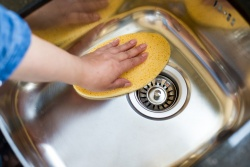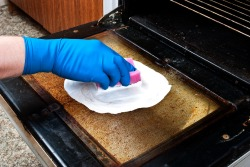As we look for greener, eco-friendly ways to live, many homeowners are turning their backs on toxic cleaning products by cutting them out of their cleaning routines.
 Use a partially wet microfibre cloth to clean and buff stainless steel appliances. This will keep them shiny and free of finger marks.
Use a partially wet microfibre cloth to clean and buff stainless steel appliances. This will keep them shiny and free of finger marks.They’re also looking at alternative cleaning options that are inexpensive but still manage to remove grime and dirt. All you need are a few household products that have cleaning properties. Get some tips…
1. Keep stainless steel appliances shiny
Stainless steel appliances look gorgeous in a modern kitchen, but are a nightmare to keep shiny if you have children.
Rather than using toxic chemicals, buy a pack of microfibre cloths at your local Builders store or supermarket. Then add a small amount of water to a section of the cloth so that you can wipe and buff with the same cloth. That way, you save money on unnecessary products and keep your stainless steel appliances fingerprint-free.
2. Get rid of sink and tap grime
After wiping down the sink, spray a generous amount of white spirit vinegar over the sink and taps. Pay special attention to small crevices around the tap and drain. Let this sit for about 10 minutes and then use an old toothbrush and sponge to wipe and rinse with clean water.
 Spray a generous amount of white spirit vinegar over your sink and taps. Let the solution sink in for about 10 minutes and then use an old toothbrush and sponge to wipe and rinse with clean water.
Spray a generous amount of white spirit vinegar over your sink and taps. Let the solution sink in for about 10 minutes and then use an old toothbrush and sponge to wipe and rinse with clean water.Buff to a high shine with a microfibre cloth. To tackle tough grime build-up, repeat the process.
Good to know
Do not use vinegar on granite or marble. Because these are naturally porous, the vinegar will damage them.
3. Unclog spray attachments
Hard water and mineral deposits can clog up a spray attachment in a shower or bathroom. To reverse the process, use white spirit vinegar to unclog the attachment.
For a bathroom or kitchen shower attachment, submerge the head in a container of vinegar for about 30 minutes. Use an old toothbrush or soft nail brush to clean away the scale.
For stubborn deposits, you may need to repeat the process.
Good to know
Use toothpicks to clean out aeration or water holes on spray heads.
4. Remove scale from a showerhead
 Make a paste using baking soda and water to spread over a just-warm oven. Close the door and leave this overnight before scrubbing it off the next day.
Make a paste using baking soda and water to spread over a just-warm oven. Close the door and leave this overnight before scrubbing it off the next day.If you’d like to remove hard water and mineral deposits from a showerhead, you can do this easily.
Add some white spirit vinegar to a plastic bag, place this over the showerhead and tie it off with an elastic band. Leave this on overnight.
In the morning, give the showerhead a light scrub with an old toothbrush or soft nail brush, and then buff to a high shine with a microfibre cloth.
5. Clean a steam iron
Sooner or later you may need to clean the heating plate on an iron, depending on who uses the iron and how often it is used.
When tackling this task, the most important factor you need to bear in mind is to avoid scratching the plate. To do this, you’ll need to avoid using scouring pads or harsh abrasive cleaners.
Where there are mineral deposits [hard water or lime scale] on the heating plate, combine two parts white spirit vinegar with one part salt in a pot, and heat this until it’s dissolved.
Do not boil the solution – simply remove it from the heat as soon as the salt dissolves. Allow it to cool and then rub it over the heating plate with a soft cloth.
 Instead of using glass cleaner on shower doors, fill a spray bottle with white spirit vinegar and spray this liberally onto the glass. Allow it to sit for five minutes, and then use a soft cloth to wipe the glass clean.
Instead of using glass cleaner on shower doors, fill a spray bottle with white spirit vinegar and spray this liberally onto the glass. Allow it to sit for five minutes, and then use a soft cloth to wipe the glass clean.For burn marks, soak a thick cloth in the solution and let the iron sit on this for an hour, before rubbing it down. Any remaining burnt material can be removed with a soft cloth and a dollop of toothpaste. The toothpaste acts as a rubbing compound without damaging the heating plate.
Good to know
Use a cotton bud soaked in the vinegar and salt solution to clean steam holes in the heating plate.
6. Get rid of oven grease
Oven cleaners are one of the most toxic cleaners you can use in a home.
You can get rid of oven grease with a solution of white spirit vinegar and baking soda. The principle is simple: make a paste using baking soda and water to spread over a just-warm oven. Close the door and leave this overnight before scrubbing it off the next day. Remove any remaining marks with a quick spritz of white spirit vinegar and wipe clean.
7. Remove hard water build-up
Most shower doors form a build-up of hard water, lime scale or soap scum. This reveals itself as an opaque haze on glass that can be difficult to remove.
Instead of using glass cleaner on shower doors, fill a spray bottle with white spirit vinegar and spray this liberally onto the glass. Allow it to sit for five minutes, and then use a soft cloth to wipe the glass clean.
Repeat this for glass that has stubborn stains or a build-up of residue.
The next time you go shopping, leave out the toxic cleaners and add a bottle of vinegar and some baking soda for a healthy home.
Article courtesy of www.home-dzine.co.za.







